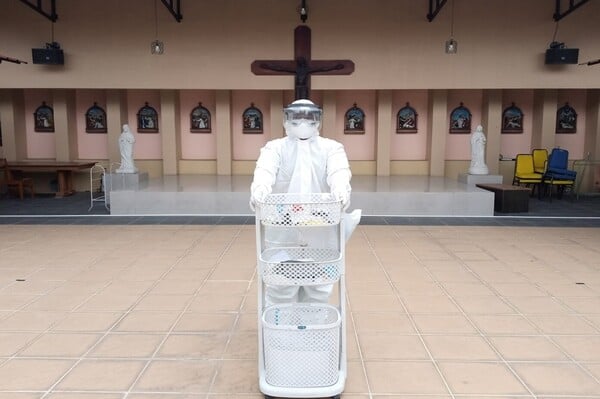Albertus Adiwenanto Widyasworo is a 35-year-old seminarian at the Jakarta Archdiocese-run John Paul II Major Seminary in Central Jakarta. He entered the major seminary in 2015 after working for six years as a doctor at St. Carolus Hospital, also located in Central Jakarta.
When Indonesia was dealing with the highest daily rise of COVID-19 cases last June, due to the more contagious Delta variant, he decided to risk his own health and life and return to his roots as a doctor to serve COVID-19 patients undergoing self-isolation at the archdiocese’s Wisma Samadi Pastoral Center, which had been converted into a self-isolation ward. More than 150 patients have recovered at the facility.
Widyasworo, who graduated in 2009 from the Medical Faculty at the Semarang-based University of Diponegoro, recently spoke with Aid to the Church in Need:
“The situation got worse at that time. Hospitals experienced shortages of beds and medical workers. I heard that the Wisma Samadi Pastoral Center was converted into a self-isolation ward. Father Yustinus Ardianto, who serves as the pastoral center’s director, could not handle it all alone. I was also afraid that no medical workers would be available to treat patients there. That is why I wanted to make sure that they all would be just fine. It was a form of a collegiality.
“All seminarians took part in the initiative. They did what they could. But who would do the health check-up of the COVID-19 patients? Finally, I asked for permission from the rector of the major seminary. A seminarian’s service is actually based on a certain mission, and it was not my mission to help Father Yustinus in treating the COVID-19 patients at Wisma Samadi Pastoral Center. At that time, St. Carolus Hospital lacked doctors as a number of doctors were also undergoing self-isolation, so it would be difficult for the priest to get help from the hospital. I am a seminarian but also a doctor. Thanks be to God, the rector of the major seminary granted me permission.
“The first thing I did was to make sure that each COVID-19 patient had a medical record. Then I taught all persons involved in the service about, for example, how to wear personal protective equipment properly so as to prevent them from being infected with COVID-19.
“I visited the COVID-19 patients all alone every noon in the beginning. I had to wear a personal protective equipment. I checked their vital organs, chatted with them, and ensured that they had medicine and multivitamins. But I was overwhelmed, so I tried to get help from my fellow doctors. Luckily, St. Carolus Hospital assigned a doctor to treating the COVID-19 patients. It helped me a lot.
“One interesting thing was how I cheered up the COVID-19 patients. I talked and laughed with them. I told them that the medicine and multi-vitamins I gave to them were the best. I also told them that I was a COVID-19 survivor.
“To be honest, I was afraid to see and to treat the COVID-19 patients. Some of my fellow doctors were fighting hard for their recovery from COVID-19 at that time. Some even died. All I could do was to pray to God that I would not be infected with COVID-19. I asked myself: ‘Who else would check on the COVID-19 patients if I were to be infected with COVID-19?’
“On the other hand, I thanked God for this opportunity. I believed that God would surely keep me safe if he wanted me to continue my service. And if I had to die, I would die in peace, as I had done my best to serve others in this world. St. Paul said: ‘I have fought the good fight, I have finished the race,’ so there would be no regret at all.
“Well, it all goes back to my spiritual journey. I felt this call to be a priest when I was still an elementary school student. I was so excited to see a priest. For a child like me, a priest was a good person. The call returned when I was a senior in high school, and I told my parents about it. But they wanted me to become a doctor, instead. I said okay. But I told them that I would enter a seminary after becoming a doctor. We had an agreement.
“My vocation was reinforced when I was treating HIV patients at the hospital. Most of them came from the lesbian, gay, bisexual and transgender community. I could help them with medicine, but once they left the hospital, they returned to their difficult life. It made me really sad. I read a lot of books about the life of saints, and this inspired me. I realized that God could work in me optimally once I become a priest.”
This interview is reprinted with permission from the Aid to the Church in Need in the United States







